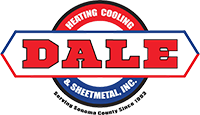A dual fuel system is a highly energy efficient HVAC system which offers consistent indoor comfort levels all year long.
Find out what benefits you may enjoy if choosing a dual fuel HVAC system for your home.
Dual Fuel System Components and Set Up
A dual fuel HVAC system comes either in a combined unit or as a split system, which uses both a gas furnace and electric heat pump.
Dual Fuel maximizes the heat pump’s ability to use both cooling and heating functions efficiently, while at the same time using the stable heating capacity of a gas furnace as a secondary heat source.
Based on the weather outside, the dual fuel systematically switches between the two cooling and heating sources, delivering the maximum comfort level for your home.
How It Works
When temperatures outside heat up, settings on the thermostat direct the heat pump to generate cool air. The heat pump acts as a central air unit, keeping your home cool and comfortable even in sweltering heat.
When your home requires heat, the heat pump reverses its refrigerant flow, now providing warm air. In this case, the heat pump switches functions from acting as a central air unit to the more common heat pump function of supplying heat.
During setup, a preset heating capacity is programmed into the heat pump and thermostat. When heat requirements exceed the preset heating capacity, the heat pump goes into pause mode at which time the gas furnace kicks in as a back-up heating source. The gas furnace runs until the temperature reaches the temperature indicated on the thermostat.
The point at which the dual fuel system switches over from the heat pump to the gas furnace is preset on the thermostat by either you or your HVAC installer.
Benefits of a Dual Fuel HVAC System
Energy efficiency is the biggest benefit of the dual fuel system because in most cases, it’s cheaper to maintain an electric heat pump than a gas furnace.
However as far as cost savings, it depends on how much gas and electricity cost in your area. If electricity costs are higher and you run the heat pump more than the gas furnace, you won’t save money on energy costs. The same goes for running the furnace more if gas prices are higher in your area, which will also not save on energy costs.
Cost savings depend on how long both the heat pump and gas furnace have to run to hit and maintain the temperature preset into the thermostat.
Consulting with a professional HVAC installer and crunching the utility cost numbers in your area can help determine whether a dual fuel system makes sense for you from an energy cost savings perspective.
Another benefit is that with some gas furnaces, it may be possible to replace your existing AC unit with a heat pump and configure the heat pump to fit and work with your existing gas furnace. A licensed HVAC installer would have to check your existing gas furnace to see if it’s compatible with a dual fuel system set up.
Conclusion
While a dual fuel HVAC system is an exciting energy-efficient option, you definitely need to schedule a consultation with an HVAC installer to go over the details and specifics of the system, configuration, set up, and potential energy cost savings.
In Sonoma County, contact the licensed professionals at Dale HCS to discuss all your options, potential cost and energy savings and any other questions you may have about the installation of a dual fuel system.

